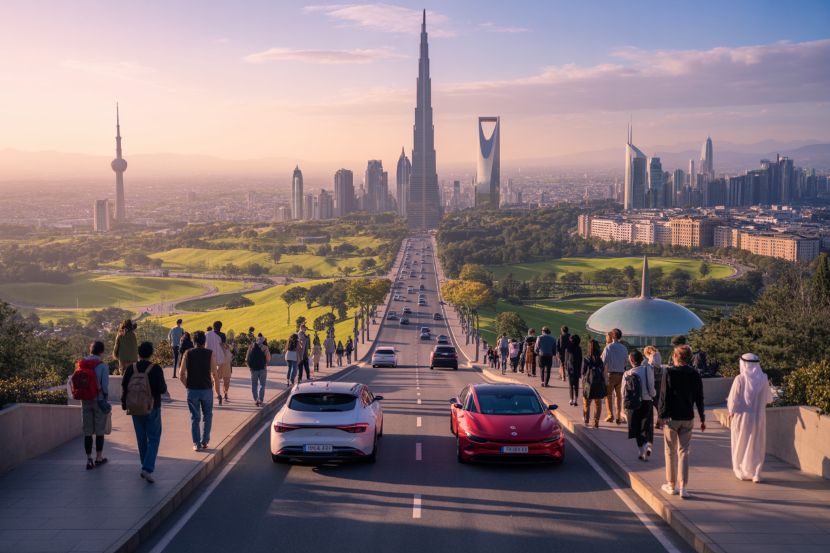Published on
November 12, 2025
As global tourism continues to rebound, the challenge of managing overcrowded tourist spots while inspiring fresh discovery has become a key focus for industry leaders. Recently, at the TOURISE conference held in Riyadh, top figures from the tourism sectors of Japan, Switzerland, Europe, and Saudi Arabia gathered to discuss the future of travel and tourism management. The conversation revolved around the smart integration of technology, sustainability, and data to reduce congestion and offer travelers unique, less-trodden paths to explore. Saudi Arabia, in particular, is setting ambitious goals to encourage visitors to venture beyond the well-known landmarks and uncover the Kingdom’s rich heritage and natural landscapes.
Innovative Technologies Shaping the Future of Travel
Global tourism is evolving, and technology is at the forefront of this transformation. In Japan, innovative solutions like time-slot management systems are already reducing long waits at popular attractions. These digital advancements not only improve the efficiency of travel experiences but also ensure a more sustainable tourism model. The integration of electric vehicles for better mobility around scenic areas and expanding parking hubs near major attractions also aligns with eco-conscious goals, reducing the environmental footprint of tourism.
Travelers to Switzerland will continue to be drawn to iconic spots like the Matterhorn, but local tourism authorities are also keen to promote lesser-known regions. By encouraging longer stays and exploring outside major hotspots, the Swiss aim to balance the impact of tourism across the country, allowing visitors to experience both well-known and hidden destinations.
Switzerland: Beyond the Iconic Landmarks
While destinations like the Matterhorn remain top of mind for most tourists, Switzerland Tourism advocates for a more balanced approach. The idea is to encourage travelers to not just visit the famed mountain peaks but also take time to discover underrated locations scattered across the Swiss landscape. This method ensures that tourism is spread across the country, reducing pressure on the busiest sites. It’s a sustainable model that helps maintain Switzerland’s pristine environments while keeping the local economy thriving.
Moreover, longer stays are encouraged, which can be seen as an investment in both the tourist experience and local culture. With more time, visitors can mix iconic sites with off-the-beaten-path spots, leaving with stories that transcend the usual tourist experience.
The Growing Role of AI in Tourism
Artificial Intelligence (AI) is playing an increasingly important role in enhancing the travel experience. By analyzing vast amounts of data, AI can predict trends, manage crowd flows, and personalize recommendations for travelers. In regions like Europe, where infrastructure is under pressure from the influx of visitors, AI allows for better distribution of people across cities and regions. This can help prevent overburdening specific hotspots, ensuring that all parts of the continent are explored.
For example, AI can assist in guiding tourists toward destinations that are equally as beautiful as the well-known cities but less crowded, ensuring a richer and more peaceful experience. As more countries adopt these intelligent systems, the overall visitor experience will improve, making tourism more enjoyable and sustainable for both travelers and locals.
Saudi Arabia: A Vision for Expanding Tourism Beyond Major Cities
Saudi Arabia is embracing a bold vision for tourism that extends far beyond its capital, Riyadh, and historic cities like Mecca and Medina. With the Kingdom’s vast natural beauty, heritage sites, and emerging destinations, there is a concerted push to inspire visitors to explore areas often overlooked by traditional tourist guides. Saudi authorities are encouraging travelers to not only visit the famous landmarks but also to venture into the unexplored deserts, coastal regions, and ancient cities that tell the story of the Kingdom’s rich history.
This shift in tourism philosophy is also supported by the growing use of digital tools, which make it easier for visitors to plan their journeys and make bookings for off-the-beaten-path destinations. The strategic shift is aimed at ensuring that Saudi Arabia’s tourism sector remains sustainable and that both travelers and local communities benefit from this influx of interest.
What Should Travelers Know?
Travelers to these countries should embrace new ways of thinking about their vacations. Rather than focusing solely on visiting the most popular tourist spots, they should seek out the quieter, hidden gems that offer unique experiences and local insights. Here are a few tips for tourists in these regions:
Use Technology to Your Advantage: Look for time-slot management programs or AI-driven apps that will help you avoid crowds and enjoy a more personalized travel experience.Explore Beyond the Iconic: While places like the Matterhorn in Switzerland or Mecca in Saudi Arabia are must-see, remember there are lesser-known spots that are equally stunning.Consider Eco-Friendly Options: Many regions are investing in electric vehicles and sustainable transport, so consider using them to reduce your environmental footprint.Plan for Longer Stays: Stay in a region for longer to explore both popular and off-the-radar locations. This will give you a deeper understanding of the culture and landscape.The Future of Travel: A Collaborative Approach
The discussions held at the TOURISE conference underscored the importance of collaboration among governments, travel operators, and technology companies. This united approach is essential for promoting tourism growth while avoiding the negative impacts of overcrowding. The integration of AI, sustainable practices, and data-driven solutions will be crucial in making tourism more enjoyable for travelers while protecting the environment and local communities.
Saudi Arabia’s tourism expansion model stands as an example of how countries can develop a broader, more inclusive tourism infrastructure. By encouraging visitors to look beyond the traditional hotspots, the Kingdom is setting the stage for a future where travel is more diverse, balanced, and enriching.
Key Takeaways for Tourists:Embrace the technology available to enhance your travel experience.Discover lesser-known locations that offer unique and memorable experiences.Support sustainable travel practices by using eco-friendly transport options.Stay longer in regions to explore the culture and landscape beyond the famous landmarks.
